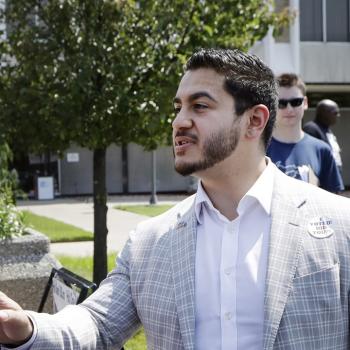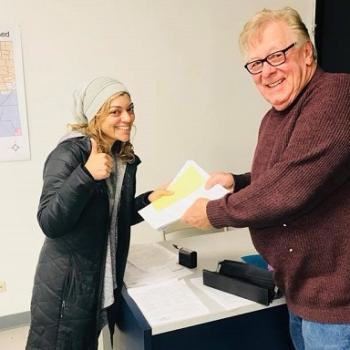 |
|
A heart the size of a mountain
|
Meet Greg Mortenson, a mountaineer turned humanitarian, whose book, written with David Oliver Relin, “Three Cups of Tea: One Man’s Mission to Fight Terrorism and Build Nations …One School at a Time”, illustrates how he build 58 schools in Pakistan and Afghanistan. Greg Mortenson is one of the rare individuals whose benevolent feats supercede their personal boundaries of language, culture, race and religion and he epitomizes the terms philanthropy and altruism.
His incredible voyage of triumph, as illustrated in the book, began in failure. In 1993, after a disastrous and catastrophic attempt at climbing K2 in Pakistan, he walked for five days, injured and emaciated, stumbling into the village of Korphe, where the villagers nurtured him for several days. While recovering, he saw their “school”, and the scene of 84 children sitting on a frosty ledge, with no roof over their heads, writing on the ground with sticks, promulgated his life’s vocation. Since they couldn’t afford their own teacher at $1 a day, they shared one with a neighboring village. Appalled, he rashly promised the villagers he would build them a school.
In America, raising $12,000 was no mean task for a climber who lived out of his car. Frustrated at the lack of response from the famous people to whom he wrote 580 letters of appeal, he even sold his car. It was not until his niece’s school raised $623 that fundraising success ensued. Then fortunately, Jean Hoerni, a physicist and a one-time trekker to the Karakorum Mountains, gave him $12,000. Back at the village, he realized they would have to build a bridge first to carry the school construction supplies. Undaunted, he went back to raise more money, returned to build the bridge with the villagers, and then built the first school. Now, after 31 trips over 14 years, Mortenson’s non-profit Central Asia Institute has built 52 schools in Pakistan, 6 in Afghanistan, (and also 30 tent schools after the earthquake of 2005) helping educate 24,000 children, some of whom walk up to three hours a day to attend classes.
Mortenson has made tremendous personal endeavors to build cultural bridges with the people of the Northern Pakistani, having learned to speak Balti, Farsi and Urdu. In addition to reading the Qur’an and studying Islam, he always portrays a constructive image of Muslims in all his interviews and publicity appearances. His journey, though, has had some treacherous bends. In Afghanistan, he was kidnapped and held captive for eight days. After September 11, he received death threats by Americans and has been “debriefed” by the CIA twice. Two separate fatawas issued against him to banish him from Pakistan for educating girls were repealed by enlightened clerics.
Mortenson admits the book’s subtitle One Man’s Mission to Fight Terrorism and Build Nations One School at a Time (chosen by the publisher) is a distortion. “I don’t really care about fighting terror,” Mortenson tells me. “The biggest issues in the world we need to address today are poverty, illiteracy, ignorance. Ignorance breeds hatred.” And as the book title implies, it’s important to have ‘three cups of tea’ to do business in that part of the world. As he explains, “The first cup of dudh patti (Pakistan’s sweet milk tea) or kahawa (green tea in Afghanistan) – you are a stranger. The second cup – you become a friend. And the third cup – you become family – but the process takes several years and is about relationships. When you are family, your hosts are prepared to even die for you. Here in America, we have two minute football drills, thirty minute power lunches, drive through fast food, and six second TV sound bytes, but in Pakistan and Afghanistan it takes three cups of tea…”
One memorable situation from his 14 years experience, as elucidated in the book, is when he built the first school and was micromanaging and trying to hasten the construction. One of the village elders led him aside and said, “We’ve been here for hundreds of years, and we’re grateful to Allah that you’re helping us build a school. But you need to do something: You need to sit down and shut up and let us do the work.” He learned to listen rather than deliberate and to let the communities be empowered to do the work themselves, rather than commanding them. It is no wonder then Mortenson’s picture appears over hearths and on Jeep dashboards throughout northern Pakistan.
Mortenson grew up in the proximity of Mount Kilimanjaro, where his father found Tanzania’s first teaching hospital and his mother launched an international school. That personal history seems to compel his tenacious struggle, despite the hurdles he faces. “When I see those little girls their tiny bare feet, or in plastic Chinese boots, walking to school those little footprints in the dust may be tiny, but I think of Neil Armstrong on the moon,” says Mortenson. “She’ll become a role model, a giant leap for her community.” Case in point: a girl named Aziza was the first educated female in the Charpusan Valley in northern Pakistan. Before her maternal health care training, five to 20 females died in childbirth every year in her valley – there were no doctors, medicine or clinics – and one out of three children died before the age of one. Since she received her training and returned to her village in 2000, not one woman has died in childbirth, and the infant mortality rate has gone down to about one in five.
Mortenson’s monumental humanitarian effort and his ideology of loving every child as much as his own two children have earned him many humanitarian and peace awards, but no honor is so gratifying to him as the smile of an impoverished child rewarded by knowledge. “I look into the eyes of my children, and I see the eyes of children in Pakistan and Afghanistan,” he says. Some of the students who yielded more than literacy are now in college and technical training centers, studying to be teachers, medical health care workers, computer technicians and engineers. Greg Mortenson says of global literacy, “There are over 145 million children in the world today deprived of education (age 5-14), and the cost to provide them an education is only about $1 per month per child. The total cost would be a global investment of $6 billion per year for 15 years. Last year, the US government spent $94.2 billion in Iraq and $14 billion in Afghanistan solely for the ‘war on terror’. With the same money we could eliminate global illiteracy in 18 months!”
Stubborn hope begins in the dark, as Anne Lamott expressed, while waiting for the dawn to come, and likewise Mortenson’s optimistic quest today is a magnanimous vision for the children of tomorrow.
Sadia Ashraf is a mural artist (www.ashmurals.com), a free-lance journalist and creative writer who has written for Muslim Girl and Chicago Crescent. Her Graduate English degree from Loyola University focused on post-colonial studies. Greg Mortenson is currently visiting America for a book tour. For further information and donations, please visit gregmortenson.com, ikat.org, or call (406) 585-7841.











